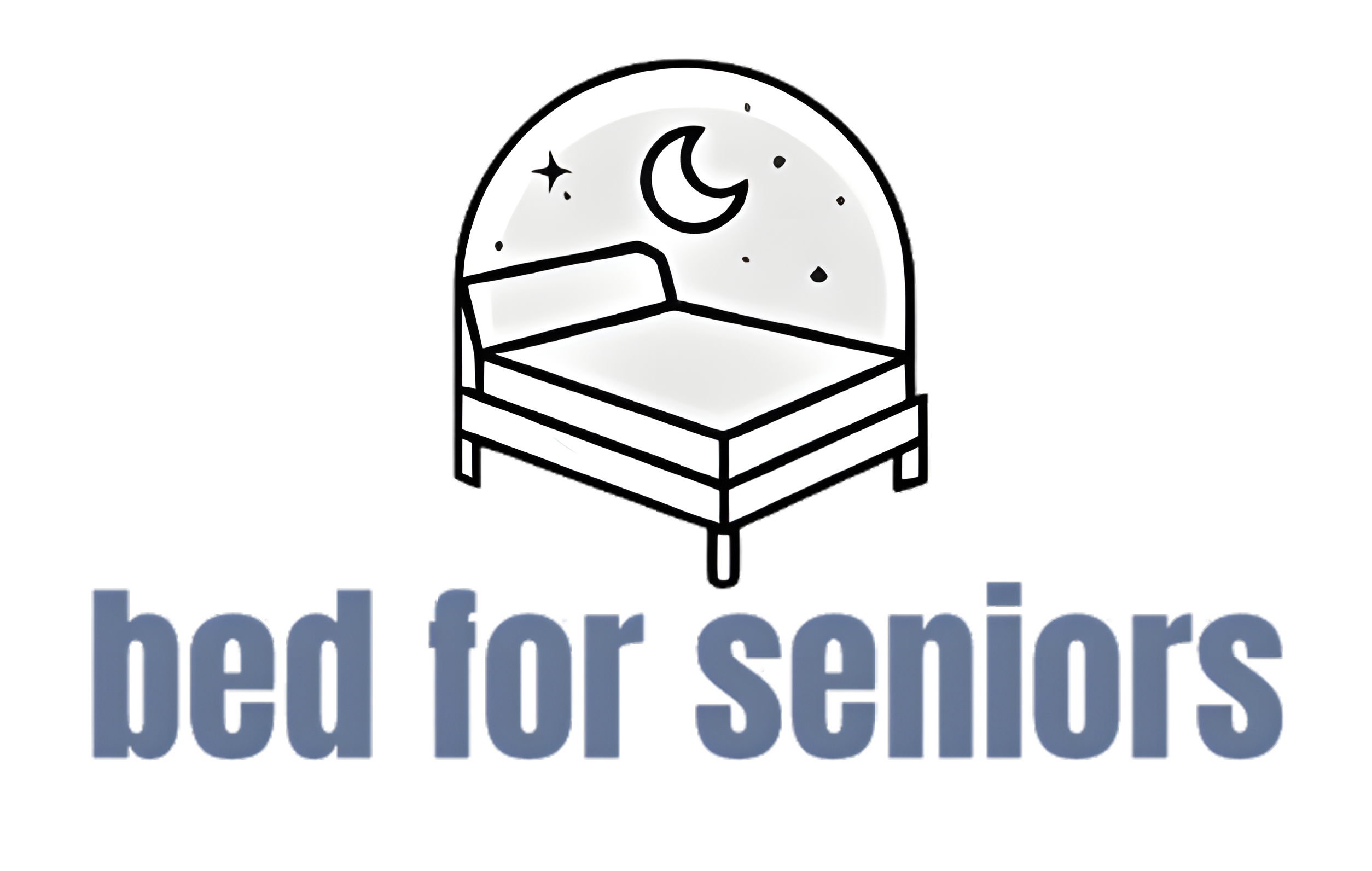Sleep troubles plague many seniors, affecting their daily lives and health. A recent study of 106 participants found that pillow choice significantly impacts sleep quality and comfort.
This article explores how the right pillow can improve senior sleep, ease pain, and boost overall well-being. Ready to rest easy?
📋✅
- The right pillow can ease neck pain, improve spinal alignment, and reduce sleep disorders in seniors.
- Memory foam, wedge, and contour pillows offer targeted support for different sleep positions and health concerns in older adults.
- Pillows between the knees help align the spine and reduce pressure on hips and lower back for side sleepers.
- New latex, polyester, and foam contour pillows lead to fewer instances of morning neck pain compared to regular foam or feather pillows.
- When choosing pillows for seniors, consider factors like loft, firmness, hypoallergenic properties, durability, and ease of cleaning.
The Importance of Proper Pillow Support for Seniors

Proper pillow support is crucial for seniors’ sleep quality and overall health. The right pillow can ease neck pain, improve spinal alignment, and reduce sleep disorders common in older adults.
Neck Support
Proper neck support is crucial for seniors’ sleep quality. A well-designed pillow maintains the natural curve of the neck, reducing strain and discomfort. Contoured memory foam pillows excel at this task, molding to the individual’s shape and providing consistent support throughout the night.
These pillows help seniors wake up with fewer aches and pains.
A good pillow is like a silent guardian for your neck, working tirelessly to ensure you wake refreshed and pain-free.
Research shows that new latex, polyester, and foam contour pillows lead to fewer instances of morning neck pain. This finding underscores the importance of selecting the right pillow material and design for optimal neck support.
For caregivers, choosing the appropriate pillow can significantly improve their loved one’s sleep experience and overall well-being.
Back Support
Proper back support during sleep is crucial for seniors. Pillows play a key role in maintaining spinal alignment and reducing pressure on the lower back. A well-placed pillow can alleviate discomfort and improve overall sleep quality for older adults.
Research shows that sleep quality directly impacts waking symptoms like stiffness and scapula pain in seniors.
For optimal back support, seniors should consider using a pillow between their knees while sleeping on their side. This simple technique helps align the spine and reduces strain on the hips and lower back.
Wedge pillows or adjustable bed bases can also provide elevated support for those with acid reflux or breathing difficulties. These solutions promote better sleep hygiene and contribute to a healthier lifestyle for older adults.
Knee Support
Knee support pillows offer seniors significant relief from lower body discomfort. These cushions, placed between the knees, help align the spine and reduce pressure on hips and lower back.
For side sleepers, a pillow between the knees keeps the legs parallel, preventing the upper leg from pulling the spine out of alignment. This simple adjustment can lead to fewer aches and improved sleep quality.
Caregivers should consider the pillow’s density and size when selecting knee support for seniors. A firm pillow maintains proper positioning throughout the night, while a softer one might compress too much.
The right size depends on the individual’s body type and sleeping position. Some seniors may benefit from longer body pillows that support both knees and ankles simultaneously.
Types of Supportive Pillows for Seniors
Seniors benefit from specialized pillows designed for their unique needs. Memory foam, wedge, and contour pillows offer targeted support for different sleep positions and health concerns.
Memory Foam Pillows
Memory foam pillows offer unique benefits for seniors seeking better sleep. These pillows mold to the shape of the head and neck, providing personalized support. Their solid cores maintain shape well over time, reducing the need for frequent replacements.
This conforming quality helps distribute pressure evenly, potentially easing pain in sensitive areas.
For caregivers, memory foam pillows present a practical option. They adapt to different sleep positions, accommodating seniors who may shift during the night. The pillows’ ability to alleviate pressure points could lead to fewer sleep disturbances and improved rest quality.
Selecting hypoallergenic memory foam can also help reduce allergen buildup, promoting a cleaner sleep environment for seniors with sensitivities.
Wedge Pillows
Wedge pillows offer a unique solution for seniors struggling with sleep issues. These triangular-shaped cushions elevate the upper body, providing relief from acid reflux, snoring, and sleep apnea.
They’re particularly helpful for those with respiratory problems or back pain. Caregivers often find wedge pillows useful in preventing pressure sores – a common concern for bed-bound seniors.
Many wedge pillows are made from memory foam, which molds to the body’s shape for extra comfort. They come in various sizes and angles, allowing customization based on individual needs.
Some even feature cooling gel layers to regulate temperature during sleep. For seniors recovering from surgeries or dealing with chronic conditions, wedge pillows can be a game-changer in improving sleep quality and overall well-being.
Contour Pillows
Moving from wedge pillows, let’s explore another option designed for senior comfort. Contour pillows offer a unique shape that caters to the natural curves of the neck and head. These pillows feature a depression in the center with raised edges, providing better support for the cervical spine.
Research shows foam contour pillows outperform regular foam or feather pillows in comfort and sleep quality. They also reduce instances of waking cervical pain – a common issue for many seniors.
This design helps maintain proper alignment, potentially easing discomfort from conditions like arthritis or osteoporosis. For caregivers, these pillows can be a valuable tool in promoting restful sleep and managing pain for their elderly loved ones.
How Pillows Influence Sleep Quality in Seniors
Pillows play a crucial role in senior sleep quality. They provide support for the neck, back, and knees, which can reduce pain and improve comfort. The right pillow can enhance alignment and posture, leading to better rest.
Want to learn more about choosing the perfect pillow for seniors? Keep reading!
Enhancing Sleep Comfort
Proper pillow support plays a crucial role in enhancing sleep comfort for seniors. Comfortable pillows can reduce neck and back pain, promoting better rest throughout the night. A study found that all participants who reported poor sleep quality also complained about uncomfortable pillows.
This underscores the importance of selecting the right pillow for optimal sleep.
Polyester and latex pillows have shown promising results in improving sleep quality among older adults. These materials offer a balance of support and softness, adapting to the sleeper’s head and neck position.
For seniors with specific health concerns, orthopedic pillows may provide targeted support to alleviate discomfort and enhance overall sleep experience. Next, we’ll explore how pillows can help reduce pain and discomfort during sleep.
Reducing Pain and Discomfort
Enhancing sleep comfort goes hand in hand with reducing pain and discomfort for seniors. Pillows play a crucial role in this aspect. They help alleviate pressure points and support proper spinal alignment, which can significantly decrease aches and stiffness.
For seniors dealing with neck or back pain, the right pillow can make a world of difference. New latex, polyester, and foam contour pillows have shown promising results. Studies indicate these types produce lower frequencies of waking cervical pain compared to regular foam or feather pillows.
This finding is particularly relevant for caregivers looking to improve their elderly loved ones’ sleep quality. By choosing the appropriate pillow, caregivers can help seniors wake up feeling refreshed and with less discomfort, potentially improving their overall quality of life.
Improving Alignment and Posture
Proper pillow support not only reduces pain but also improves overall body alignment and posture during sleep. Contoured memory foam pillows play a crucial role in maintaining neck alignment, reducing strain on the cervical spine.
This alignment benefit extends beyond the neck, positively impacting the entire spinal column.
For seniors with hip or lower back issues, placing a pillow between the knees can work wonders. This simple adjustment aligns the spine and lessens pressure on the hips and lower back.
Over time, consistent use of supportive pillows can lead to better posture even during waking hours, potentially reducing the risk of falls and improving overall mobility for older adults.
Choosing the Right Pillow for Senior Sleep Needs
Picking the right pillow can make a big difference in sleep quality for older adults. Factors like loft, firmness, and material play key roles in comfort and support for aging bodies.
Considering Pillow Loft and Firmness
Pillow loft and firmness play crucial roles in senior sleep quality. Loft refers to the height of a pillow, categorized as low, medium, or high. Firmness indicates the level of support, ranging from soft to firm.
For seniors, choosing the right combination depends on their sleep position and individual needs.
Different sleep positions require specific pillow characteristics. Side sleepers often benefit from higher loft and firmer pillows to maintain proper spine alignment. Back sleepers may prefer medium loft with moderate firmness.
Stomach sleepers typically need low loft, softer pillows to prevent neck strain. Adjustable pillows offer versatility, allowing seniors to customize their sleep support as needed.
Assessing the Material for Hypoallergenic Properties
Hypoallergenic materials play a crucial role in pillow selection for seniors. These fabrics resist dust mites, mold, and other common allergens that can disrupt sleep. Memory foam and latex pillows often boast hypoallergenic properties, offering a safer option for those with sensitivities.
Natural fibers like organic cotton or bamboo also provide allergy-friendly alternatives.
Caregivers should examine pillow labels carefully for certifications indicating hypoallergenic status. Some manufacturers use special treatments to enhance allergen resistance. Regular washing of pillowcases and pillow protectors helps maintain a hygienic sleep environment.
For seniors with severe allergies, consulting a sleep medicine specialist may provide tailored recommendations to improve sleep quality and reduce allergy-related sleep disturbances.
Evaluating Durability and Ease of Cleaning
Durability and ease of cleaning are crucial factors in selecting pillows for seniors. Research shows foam regular and feather pillows often need replacement within 18 months. In contrast, polyester, foam contour, and latex pillows last longer.
Caregivers should look for pillows that can withstand frequent washing without losing shape or support.
Cleaning methods matter too. Machine-washable pillows simplify upkeep, saving time and effort. Some pillows come with removable, washable covers – a handy feature for maintaining hygiene.
The right balance of durability and easy care ensures seniors enjoy clean, comfortable sleep support night after night. Next, let’s explore the best bed accessories for seniors.
Best Bed Accessories for Seniors
Bed accessories play a crucial role in enhancing senior sleep quality. Supportive pillows top the list – memory foam options provide excellent neck support, reducing strain for restful nights.
Wedge pillows help seniors with acid reflux or breathing issues. Knee pillows align the spine, easing pressure on hips and lower back. Bed rails offer safety and mobility assistance.
Mattress toppers add comfort and pressure relief. Heated blankets soothe aches and improve circulation.
Seniors benefit from specialized bedding too. Moisture-wicking sheets keep skin dry and prevent irritation. Adjustable beds allow customized positioning for comfort and health needs.
Bed risers make getting in and out easier. Overbed tables provide convenient access to essentials. Bed caddies store items within reach. These accessories work together to create a sleep environment tailored to seniors’ unique needs, promoting better rest and overall well-being.
Pillows play a crucial role in senior sleep quality. The right pillow can ease neck pain, improve spinal alignment, and enhance overall comfort. Seniors should choose pillows that suit their specific needs, considering factors like firmness, material, and support level.
Regular pillow replacement ensures optimal sleep conditions for older adults. Quality sleep, supported by the right pillow, contributes significantly to seniors’ health and well-being.
FAQs
1. How do pillows affect sleep quality for seniors?
Pillows play a big role in sleep quality for older adults. They support the head and neck, helping with sleep patterns and physical health. A good pillow can reduce sleep problems like obstructive sleep apnea. It also helps with the body’s internal clock.
2. What pillow types are best for seniors?
Seniors may prefer down pillows or feather-pillows. These offer soft support and insulation. Some find memory foam helpful for neck pain. The right pillow depends on sleeping habits and health needs. For example, those with hip replacements might need special support.
3. How often should seniors replace their pillows?
Experts say to replace pillows every 1-2 years. Old pillows can harbor dust mites and affect smell. This can lead to allergies and poor sleep. Machine wash pillows regularly to keep them clean. This helps maintain good sleep hygiene and overall wellness.
4. Can pillows help with specific senior sleep issues?
Yes, pillows can aid various sleep-related disorders. They may help with restless leg syndrome, bloating, and tiredness. The right pillow support can ease pain from arthritis or other age-related conditions. This can lead to better sleep architecture and less sleep deprivation.
5. Is there research on pillows and senior sleep?
Many studies look at sleep quality in older adults. A systematic review in the Cochrane Library explored this topic. Researchers use methods like logistic regression and generalized linear models. They look at factors like demographic data and lifestyle habits. Results often show statistical significance (p<0.05) in how pillows affect sleep.
6. How do pillows fit into overall senior sleep health?
Pillows are part of a bigger picture. Good sleep involves many factors – diet, exercise, and stress levels. Pillows work with mattresses to create a comfy sleep environment. This combo helps fight issues like obesity and heart disease. It’s key for physical well-being as part of a healthy lifestyle.









